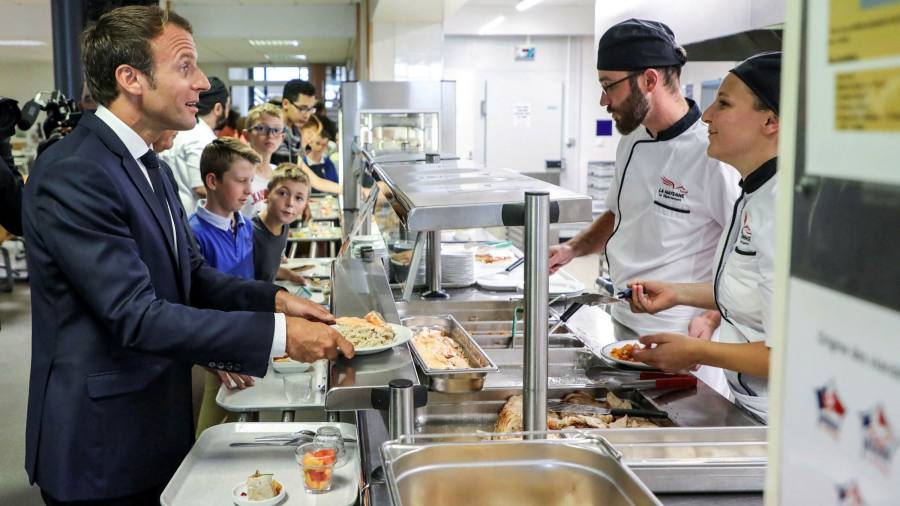[ad_1]
Is contemporary France under threat from legions of politically correct militants and academics who aim to impose gender-neutral language, vegetarianism and “Islamo-leftism†on this ancient land?Â
Or is Emmanuel Macron’s administration shamelessly courting rightwing voters by stoking their anger over imagined assaults on the language of Molière, the right to eat steak tartare and the republic’s tradition of secularism?
Both may be true, judging from the raucous conflicts that have erupted in recent weeks. It is no coincidence that politicians are also looking to the country’s regional elections in June and next year’s presidential poll, when Macron will try for his second term in the Elysée Palace.
The language debate manifested itself in the form of a draft law — promoted by 60 members of parliament from the centre-right Les Républicains and Macron’s La République en Marche parties — to ban “inclusive language†in official documents.Â
The MPs argue that neologisms such as “iels†instead of “ils/elles†(the masculine and feminine for “theyâ€) and “toustes†instead of “tous/toutes†(“allâ€) are confusing, especially for those with language difficulties. They also detest the median full stops inserted to embrace both genders in a language where all nouns have gender and the masculine has long taken precedence in plurals describing mixed groups (the gender-neutral way of writing “Dear reader(s)†is the unpronounceable “Cher·e·s lecteur·rice·sâ€).Â
Adapting French to modern times can be tricky — I know a mayor who prefers to be called “Madame le maire†(using the masculine “le†because the word for mayor is masculine) but no longer frets if someone says “Madame la maire†— but the arguments have been simmering for years and are unlikely to be legislated away.Â
Politics and left-right divisions were equally prominent in a recent storm over the meat-free meals imposed on the schoolchildren of Lyon by the city’s Green party mayor, Grégory Doucet. He was accused of starving pupils of nutritious French beef in pursuit of his ecological ideals, even though he said he was just trying to avert lunch queues to stop the spread of Covid-19 — and his centre-right predecessor as mayor had done exactly the same last year.
As for the row over “Islamo-leftismâ€, higher education minister Frédérique Vidal struck a nerve last month when she announced an investigation into islamo-gauchisme at the country’s universities. It triggered a furious response from hundreds of professors who called for her resignation and bafflement from the organisations supposed to conduct an inquiry into something they were not sure actually existed.Â
The term islamo-gauchisme was coined by the political scientist Pierre-André Taguieff and originally referred to the meeting of minds between the extreme left and the Islamists of Hamas, Islamic Jihad and Hezbollah in support of the Palestinians in the second intifada. It has since become a verbal weapon to beat suspected opponents of the government’s campaign against Islamist “separatism†in Muslim-dominated towns and suburbs, or those who nurture a “victim culture†among religious or ethnic minorities.
Vidal’s supporters point to what they see as disturbing cases of “de-platforming†at universities, including an anti-racism protest that stopped a performance of the Aeschylus tragedy The Suppliants at the Sorbonne university when a rehearsal photo showed an actress with dark make-up assumed to be “blackface†in place of the Greek masks used when the play was finally performed.
Macron’s own position is ambiguous, as befits a president elected in 2017 on a promise to be “neither right nor leftâ€. But he told his ministers to stop arguing about the merits of vegetarianism and gender-neutral grammar and get on with managing a coronavirus pandemic that has killed more than 85,000 people in France.Â
“Let’s start by fighting for things that have the most impact for French women,†was the crisp response of Macron loyalist Agnès Pannier-Runacher, the minister responsible for industry, when asked in a television interview whether her office used inclusive writing.Â
[ad_2]
Source link





